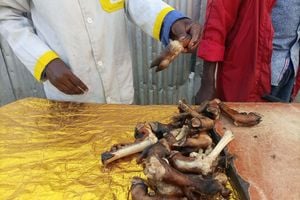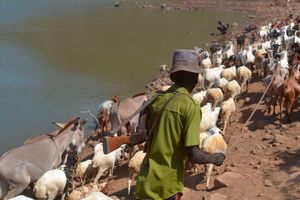
Despite the financial strains, Kenyans will still find a reason to celebrate.
When bells jingle and there are no coins for a celebration, the end is a broke Jesus Christ’s birthday.
Yet, most Kenyans remain upbeat that despite the financial strains the national and international economic knocks have occasioned on disposable incomes, they will still find a reason to celebrate – but for different reasons.
Says Bishop Jesse Gitahi of the Priesthood Fellowship Churches: “This Christmas and New Year should be observed as a season of lamentations to God to renew His covenant with the world so as to escape the tragedies lurking in all corners.”
He adds that armed conflict, killings, corruption and bad politics should be prayed for during the festivities.
According to Bishop Gitahi, the celebrations should not be dulled by the poverty, violence and deaths surrounding us but be of singing with joy and fasting, expecting that 2025 would be the rebirth of hope and blessings.
Despite studies saying Kenyans are among the most optimistic people on the continent – with 70 percent believing the future is bright – economic hardships are hitting the faith.
“When Covid-19 came in March 2020, Ministry of Health daily briefings painted a grim picture of the future,” Mr Benson Mureithi, a teacher in Kirinyaga County, says. “I’m even surprised that the national population is still more than 50 million.”
The teacher adds that he will make merry during the festive season “to celebrate God for granting me survival”.
Mr Mureithi’s main worry is the country’s economy, which he describes as worse than any pandemic.
“I have saved Sh15,000 for this holiday but I’m not worried. I will still celebrate. Attitude is everything,” he says.
He has devised a coping mechanism. The teacher recently gave his wife Sh10,000 for the festive budget, an amount he says will be appreciated by his family of two children.
“I will then proceed to the ‘watering holes’ with the remaining amount,” the teacher says. “I will be creative enough and apply for a Sh10,000 mobile loan and a Sh10,000 Fuliza. That will cover my January salary, which I will use to settle school fees and rent”.
For Mr Mureithi, life is about planning. The teacher says he is inspired by former world heavyweight boxing champion Mike Tyson who once said that everyone has a plan until he gets punched in the mouth.
Mr Julius Kagimbi, 90, says Kenyans are resilient and will celebrate Christmas and New Year, regardless of what they are going through.
“I have seen good and bad festive seasons. It depends on what you value as a celebration. I will play my accordion and float in space down memory lane. As we usher in 2025, my prayer will be to live to be 100,” he says.
The nonagenarian adds that at his age, the celebration is about being alive and praying for good health.
Mr and Mrs Njaro Wairatu, who are 73 and 68, respectively, advise young people to live well and avoid partying.
“Many of the people born at the same time with me died young. They went fast in search of fun. Some died in bar brawls, risky love affairs and criminal activities they hoped would finance their understanding of celebrations. We lost four children to what they thought was fun. I would not want to see more young people die in this festive season,” Mr Wairatu says.
Ms Hilda Njoki, who works for a Murang’a County-based factory, says she will fast from December 24 to January 2.
“I want to ask God to have mercy on Kenyans who have to contend with many taxes and bad government programmes that only increase poverty instead of creating wealth,” she says.
Ms Lucy Karimi, a barmaid in Murang’a hopes for better things.
“As the year comes to an end, many of us who hustle almost to death – people who forego meals and other necessities to pay school fees, people who only rely on faith for healing – we hope God will have mercy. I am not cursing anyone as we mechanically march into 2025,” she says, adding that her budget for the festivities is Sh5,000.
“I will be celebrating with prayer to God for I have survived this far. I am grateful to those who loaned me money for food, rent and school fees even when I took long to pay.”
For Mr Wafula Wekesa, a resident of Maragua town, the festive seasons in the last five years have been a preserve of waheshimiwa (honourables).
Mr Wekesa says his life in Gachagi village, where he has resided since 1964, is hand to mouth. Faith for a better life is his best companion.
Mr Paul Ateka, a guard at a Thika-based plantation, says his monthly salary is Sh16,000.
“My financial problems have become a disease. Celebrating is limited to ensuring I have a meal. I save some little money that I send to my family in Kakamega,” he says.
Ms Molline Atieno, a musician, says she will celebrate Christmas and New Year in a simple way. She hopes the country’s economy will improve.
“My prayer is that widows like me will find a reason to smile, regardless of the situation. We pray not to lack,” she says.
Ms Cecilia Wairimu, 28, whose mitumba business in Nairobi’s Gikomba market was almost destroyed by two infernos, says she has no reason to smile.
“I have already apologised to my parents in Kahumbu village, Murang’a County. For the first time in the six years I have been hustling in Nairobi, I will not be joining them for Christmas and New Year celebrations,” she says.
Ms Wairimu intends to send her parents Sh2,000 as she thinks of how to settle her Sh9,000 rent arrears, spare Sh5,000 for her and her two children’s daily needs up to January 10 and Sh5,000 for any emergency that could arise.
“I have a Sh100,000 loan from a Sacco that I joined in 2014. My only hope is that the business will pick up so that I service the debt,” she says. “Should something go wrong, I will sink. I remain positive and trusting in God who has never forsaken me.”
For Mr Mwangi Mbuthia, a publisher, musician and motivational speaker, life is what you make it to be. He says it depends on how realistic one is in living within his or her means.
“As an individual who has dealt with masses for more than a decade, I say many Kenyans are in a worse situation than you. Even so, these suffering Kenyans walk around with a smile, hoping for something better,” he says.
Mr Mbuthia says some people have material wealth. “If they were to be philanthropic as God would desire of them, the cry of poverty would dissipate in 2025,” he says.
“This is the time to pray for our leaders to stop greed. They even eat poor people’s relief food and medicine. They need to stop diverting to their own gains what is meant for the poor. Those with the ability to employ should do so. We need to create jobs and break the cycle of poverty. Waking up in want is a test to those waking up in surplus. Let us be our brothers’ keepers.”
Institute of Budget director Elias Mbau says the key to unlocking financial handicaps is to “resolve that it is not a crime, abomination or blasphemous not to indulge in the typical social animal traits every year-end”.
He says the pandemic showed people how inane it is to crave more than you can chew and that it is possible to adjust lifestyles to suit the realities of the day.
“Resilience in appreciating reality is key to a happy heart. That happy heart is all you need to usher in the New Year. Don’t just sit there waiting to suffer to death or to depression. Find something you can keep yourself busy with to earn, no matter how little. God rewards determination and hard work,” he says.
Dr Mbau, however, adds that poverty levels in Kenya should be a wake-up call to the national and county governments.
“The taxes Kenyans pay are enough to reduce poverty in this country. Our policymakers ought to ask themselves where they were as Kenyans reached this low end of their financial wellness. Ask ourselves as the collective leaders’ legion what we are doing to end the dehumanising life of a majority of Kenyans,” he says.










